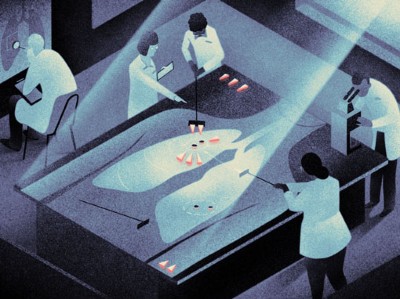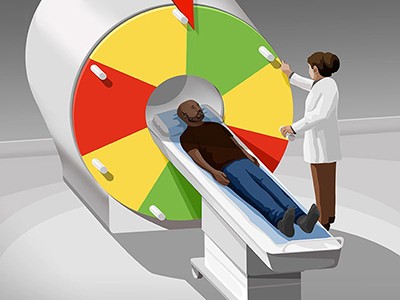A tumour (artificially colored) fills the alveolus of a human lung. Some proof means that danger of those cancers decreases with age. Credit score: Moredun Animal Well being Ltd/Science Picture Library
Changing into an octogenarian might have an sudden profit: a lower within the danger of lung most cancers, in line with two research in mice1,2.
The outcomes, posted as preprints on the bioRxiv server, spotlight particular genes that might contribute to the declining danger and reveal a stunning hyperlink between them and iron metabolism. The research haven’t but been peer reviewed.
The findings may appear counter-intuitive: most cancers is a illness related to ageing, and the chance of many most cancers diagnoses peaks in an individual’s 60s or 70s. However after that, charges of lots of these cancers mysteriously decline.
“It’s an commentary that we’ve made for many years,” says Ana Gomes, who research ageing and most cancers on the H. Lee Moffitt Most cancers Middle and Analysis Institute in Tampa, Florida, and who shouldn’t be concerned within the preprints. “However we’ve actually not been in a position to clarify why that’s.”
Age accumulation
Most cancers is brought on by DNA mutations that accumulate over time. Extra years of life imply extra alternatives to gather the constellation of mutations essential to generate rogue most cancers cells that develop uncontrollably. Immune responses that may as soon as have been in a position to maintain a tumour in verify may also grow to be extra muted with age.
However the modifications to the tissue that include ageing may also discourage tumour progress by altering the atmosphere through which most cancers cells reside. Older lungs, for instance, are likely to have extra scar tissue than youthful lungs do. Lung cells additionally grow to be much less able to regeneration, and fewer resilient to the stresses of unregulated progress. “Structurally and functionally, what you have got at an older age is a totally totally different atmosphere than what you have got at younger age,” says Gomes.
New lung-cancer medicine lengthen survival instances
To study extra about how ageing impacts tumour progress, Emily Shuldiner, a most cancers biologist at Stanford College in California, and her colleagues studied mice which have a cancer-causing mutation that the authors managed with a genetic change1. The workforce turned on these mutated genes within the lungs of younger and outdated mice, and located that tumours had been bigger and extra frequent within the youthful mice than within the older mice.
The researchers additionally used CRISPR–Cas9 gene modifying in mouse tumours to evaluate the results of inactivating every of greater than two dozen genes that usually suppress tumour progress. On common, turning off most of those genes elevated the speed of tumour progress in mice of all ages, however there have been extra tumours, and so they grew bigger, in youthful mice than in older mice. This implies {that a} totally different course of is likely to be working to suppress most cancers in older mice.
Iron grip on tumours
One other workforce led by Xueqian Zhuang, a most cancers biologist at Memorial Sloan Kettering Most cancers Middle in New York Metropolis, discovered that ageing will increase the manufacturing of a protein known as NUPR1 — which impacts iron metabolism — in mouse and human lung cells2. The cells then behaved as in the event that they had been iron poor, limiting their capability for the fast progress that could be a hallmark of most cancers.
To observe up on this discovering, the workforce used CRISPR—Cas9 gene modifying to inactivate the Nupr1 gene in older mice. Iron ranges of their lungs rose, and the mice grew to become extra susceptible to tumours, like their youthful counterparts.
The authors additionally discovered that folks over the age of 80 have extra NUPR1 of their lung tissue than do individuals beneath the age of 55, suggesting that the mechanism is likely to be conserved between mice and people.
The stress of most cancers
The outcomes properly exhibit that ageing can have an effect on the health of lung most cancers cells in ways in which forestall tumours, says Gomes. However there could possibly be necessary variations in how tumours are generated in people and in these mice, she provides. In people, cancer-causing mutations normally accumulate regularly, and the seeds of a most cancers will be planted a long time earlier than a tumour is detectable. Within the mice, nonetheless, tumours had been initiated by abruptly switching on the cancer-causing gene when the mice had been already outdated.
And outcomes from lung most cancers won’t translate to cancers in different tissues, says Cecilia Radkiewicz, an oncologist and most cancers epidemiologist on the Karolinska Institute in Stockholm. “It’s fairly totally different between totally different most cancers websites as a result of there have totally different organic drivers,” she says.
Radkiewicz has discovered that, in lots of cancers, the obvious decline in incidence with outdated age could possibly be an artefact. When she checked out how incessantly tumours had been discovered throughout autopsies, this decline usually disappeared3. This implies that the charges of assorted cancers usually stay the identical even throughout outdated age, she says, however the cancers are merely identified or reported much less usually in individuals over the age of 75.
The professionals and cons of screening
An exception, she provides was lung most cancers: its incidence did really decline in older individuals, even when accounting for post-mortem knowledge.
General, the findings spotlight the significance of learning most cancers in aged mice, says Zhuang. Such research will be troublesome, she says: it’s costly and time-consuming to rear mice into outdated age. However the outcomes might illuminate new methods of treating most cancers in young and old individuals, in addition to spotlight necessary targets for regenerative medication.
“Folks usually suppose ageing is simply unhealthy,” says Dmitri Petrov, an evolutionary biologist at Stanford College and an writer on the preprint together with Zhuang. “But when this [work] is appropriate, then ageing has a helpful function to play.”



